'Let's face this head-on' - Jockey Club chief calls for racing to get on the front foot with sport's detractors

British racing needs to face the challenge of those who wish to see the sport cease "head-on", according to the chief executive of the Jockey Club, after protesters delayed the start of Saturday's Grand National by nearly a quarter of an hour.
Nine protesters made it on to the track before the race, with some glueing themselves to the second fence and others seeking to shackle themselves to the running rail, leading to a short delay to the start.
Merseyside Police said 118 people were arrested on Saturday, with Orla Coghlan, spokeswoman for the animal rights group Animal Rising, warning that Saturday's protests were only the "beginning".
Nevin Truesdale, chief executive of Aintree's owner the Jockey Club, praised the actions of police and security staff when speaking on Sunday and called for the sport to be robust in its response to Saturday's events.
"We believe racing needs to get on the front foot with this because we have such a good story to tell and such a good record in this area in terms of the changes we've made," said Truesdale.
"I think what's happened this week, with the narrative around the protests and the law-breaking, has meant that we've had the platform to get out there, almost by right, to make the case and to fill in some of the facts against some of the misinformation we get from some of these people.
"As racing we've done a good job of that this week, but we need to continue doing it. We should be proud of our love of the thoroughbred and making the point that the thoroughbred doesn't exist without racing. Richard Hoiles made that case very eloquently this morning on LBC Radio.
"These people are coming from a place of ignorance really, in terms of how the horse operates, how it's looked after and how it's bred. Ultimately, without racing there is no thoroughbred, and that knocks on to 80,000 jobs and the UK economy.
"I think there are some people who just don't want to listen, but we should never tire of trying to make them listen and show them what we're doing. We should be proud of the fact fatalities have reduced by a third, but even prouder we're doing everything we can to reduce it even further. Let's face this head-on as a sport."

Following extensive changes to the Grand National course after the race in 2012, there were no fatalities between 2013 and 2018, but Up For Review in 2019, The Long Mile in 2021 and Eclair Surf and Discorama last year all picked up fatal injuries, while Hill Sixteen suffered the same fate when falling at the first fence on Saturday.
Sandy Thomson, trainer of Hill Sixteen, said his horse had become "hyper" during the delay to the race and felt the actions of the protesters contributed to his horse falling for the first time in his career.
There were 17 finishers on Saturday, which was consistent with recent years, with 15 completing in both 2022 and 2021, and 19 in 2019. Four fallers on Saturday was also in line with the three previous runnings, although 11 unseated riders was more than nine last year, four in 2021 and two in 2019.
The biggest difference this year appeared to be over the first two fences, with eight runners getting no further than the second compared to two, one and two during the previous three runnings, with the delay to the race potentially having an impact on the early stages.
There is sure to be increased scrutiny on the National and calls for further modifications after Saturday's protests, which were splashed across the front pages of national newspapers on Sunday, and World Horse Welfare (WHW), the charity which supports the responsible involvement of horses in sport and an independent welfare adviser to the BHA, said in a statement that "much more needs to be done" after three fatalities over the three-day meeting at Aintree.
“From Aintree to television screens across the world, this year’s meeting was difficult to watch," said Roly Owers, chief executive of WHW. "The loss of Envoye Special, Dark Raven and Hill Sixteen is heartbreaking and we offer our condolences to their connections who we know will be devastated.
“While it is true that accidents can happen anywhere – and the risks can never be removed altogether – jump racing poses specific risks that it has a responsibility to relentlessly reduce wherever possible. Whilst in the immediate aftermath of these events, it is a time to reflect and review what has happened, and it is clear to us that despite the changes made by Aintree and racing to date, much more needs to be done.
"In practical terms, this is an urgent reminder of the need to bring work on the Jump Race Risk Model to the fore. The model is a key tool to help inform how to make this and other jump races safer. Progress on this key project has not been quick enough and this needs to change now that racing has an agreement in place with the Royal Veterinary College to help take it forward.
"Overall, the types of questions that need to be considered are the number of runners, how to reduce the number of fallers, how to better manage loose horses and how to better manage the start.
"No one can accept fatalities as a certainty at any race and no one, least of all anyone in racing, wants to see what we witnessed in yesterday’s Grand National."
Truesdale said a full review would now take place and further changes to the National would at least be considered if the data supported action being taken.
"Barely a year has gone by that we haven't made some sort of change," he said. "We're never resting on this. I'm not going to sit here now and speculate on what changes, if any, we might make for next year. That's for Sulekha Varma [Aintree clerk of the course] and her team and the BHA team to determine over the next few months.
"If we found in the data, analytics and evidence that a certain change might make a positive difference then of course we'd have to at least consider it, absolutely."
Julie Harrington, chief executive of the BHA, confirmed a review of Saturday's race will occur, as will analysis of the two other equine deaths at Aintree.
“The BHA and Aintree racecourse will analyse the races in painstaking detail, as is the case every year, to build on our existing data and help us understand what caused these incidents," said Harrington.
“British racing works tirelessly to improve the sport’s safety record and reduce avoidable risk. Every incident is reviewed by the BHA, alongside the racecourse and other bodies. As a sport we have for years shown great determination and commitment to improve welfare standards by taking measured, scientific, evidence-based, regulatory and education-based steps.
“It is for this reason that the fatal injury rate in the sport has reduced by over a third in the last 20 years, to 0.2 per cent of runners."
She added: “Those involved in British racing are rightly proud of our sport and the role it plays in providing an unparalleled quality of life for horses bred for racing. Love and respect for horses is at the heart of everything we do."
Read more here:

Do you want £200+ of free bets? Racing Post have got the best offers, all in one place. Visit racingpost.com/freebets to find out more.
Published on inGrand National festival
Last updated
- Grand National 2025: date, preview and best bets
- 'I'd love to have a crack at the Grand National' - Flooring Porter team weigh up Aintree following Listowel heroics
- 'They had no chance and kept others out' - Davy Russell believes qualifying races for the Grand National should be introduced
- Bookmakers report Grand National turnover as 'flat' compared with last year
- 'It's a different feeling, it's unique, it's the Grand National' - Aintree hero I Am Maximus gets a huge homecoming welcome
- Grand National 2025: date, preview and best bets
- 'I'd love to have a crack at the Grand National' - Flooring Porter team weigh up Aintree following Listowel heroics
- 'They had no chance and kept others out' - Davy Russell believes qualifying races for the Grand National should be introduced
- Bookmakers report Grand National turnover as 'flat' compared with last year
- 'It's a different feeling, it's unique, it's the Grand National' - Aintree hero I Am Maximus gets a huge homecoming welcome